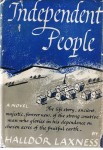
Independent People by Halldor Laxness (Knopf, 1946. ISBN (Newer Edition)978-0-8446-6949-6)
I never had the chance to break bread or have a glass of wine with Minnesota writer and Icelandic son Bill Holm. Though I was privileged to hear him read from his work and play a few piano tunes, I didn’t read any of Holm’s work until I picked up his essay collection, Eccentric Islands, a fine bit of work on its own but not the subject of this review.
Bill’s book praised to high heavens the seminal Icelandic novel, Independent People in such accolades that I was compelled to search out a used hardcover copy of the novel on the Internet. Holm himself, along with another of his Icelandic-writer pals, boasted about perusing the web to locate cheap copies of Laxness’ prose gem; the cheaper the better, was the way Holm described the competitive search for used copies of the book. The pair would then give the copies away to anyone who seemed remotely interested in reading a novel by an Icelander. Hundreds of copies of Independent People were apparently rescued from the shredder and handed out by Holm and company as a means of promoting Laxness’ work.
To the story. Bjartur, a lowly freeholder who has struggled his whole adult life to obtain a bit of craggy Icelandic farmland upon which to raise sheep and a family, is a darkly forlorn and seemingly unfeeling beast. As the protagonist of this epic saga of man against nature, other men, and himself, Bjartur is stubborn, determined, and steadfast, all to the detriment of his wives and children.
The writing contains a bit of Scandinavian mysticism and large doses of tragedy and angst. The book is similar in tone and feel to the great novels of Minnesota writers Herbert Krause and Ole Rolvaag, whose books chronicled farmers struggling to survive in seemingly inhospitable places.
Though the language may seem a tad awkward at first, there is a lyric quality to Laxness’ prose that sings of the Vikings and old Norse sagas. Bill Holm was right. Independent People is a must read for anyone interested in the great literature of Scandinavia. 4 1/2 stars out of 5.(Portions of this review first appeared in the Duluth News Tribune Sunday “Scrapbook” section).


